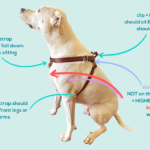Why Is My Old Dog Barking At Nothing
Why Is My Old Dog Barking at Nothing? Exploring Possible Causes and Solutions
If you have an old dog who seems to bark at nothing, you may be wondering what’s going on in their head. Is it a sign of senility or dementia? Are they hearing things that you can’t hear? Are they trying to tell you something important? Or are they just bored or anxious?
While there is no single answer to this question, there are many possible explanations for why your old dog is barking at seemingly nothing. In this article, we’ll explore some of the most common causes and solutions for this puzzling behavior.
Possible Causes of Old Dogs Barking at Nothing
1. Physical discomfort or pain.
Old dogs are more prone to various health problems that may cause them to bark more often or more loudly than usual. For example, they may have arthritis, dental issues, vision or hearing loss, or gastrointestinal distress that makes them feel uncomfortable or irritable. If your dog suddenly starts barking at night or when lying down, they may be feeling sore or stiff from lying in one position too long.
2. Cognitive decline or confusion.
Old dogs may also experience cognitive decline as they age, which can affect their memory, learning, attention, and perception. They may forget where they are or what they’re doing, become disoriented or confused by familiar surroundings, or perceive shadows, reflections, or sounds as threats. Some dogs with cognitive dysfunction syndrome (CDS) may vocalize more frequently as a way of expressing anxiety or disorientation.
3. Sensory stimulation or hallucinations.
Old dogs may also experience sensory changes that affect their perception of reality. For example, they may see flashes of light due to cataracts or retinal damage, hear high-pitched sounds due to tinnitus or hearing loss, smell phantom odors due to neurological disorders, or feel phantom pains due to nerve damage. These sensory changes may trigger barking or other vocalizations as the dog tries to make sense of what they’re experiencing.
4. Environmental triggers or boredom.
Old dogs may also bark at seemingly nothing if they are bored, under-stimulated, or anxious. For example, they may bark at shadows, reflections, or movements outside the window, or at the sound of a clock ticking, a car passing by, or a distant siren. They may also bark if they want attention, food, water, or to go outside. If your old dog is left alone for long periods of time or doesn’t have enough mental and physical exercise, they may develop destructive or obsessive behaviors that include excessive barking.
Solutions for Old Dogs Barking at Nothing
1. Rule out medical issues.
If your old dog starts barking more than usual or exhibits other unusual behavior changes, it’s important to take them to the vet for a check-up. The vet can perform a physical exam, blood tests, X-rays, or other diagnostic tests to determine if there is an underlying medical condition that needs treatment. If your old dog has arthritis or other painful conditions, you may need to adjust their diet, exercise routine, medication regimen, or environment to help them feel more comfortable and relaxed.
2. Provide cognitive enrichment.
If your old dog shows signs of cognitive decline or confusion, you can try providing them with cognitive enrichment activities that challenge their brain and senses. For example, you can hide treats around the house for them to find using their nose, teach them new tricks or commands using positive reinforcement training, play puzzle games with them that require problem-solving skills and memory recall, or give them toys that emit sounds or smells that stimulate their curiosity and interest.
3. Reduce sensory stimulation.
If your old dog seems overwhelmed by sensory stimulation or hallucinations, you can try reducing the amount of sensory input they receive. For example, you can close the curtains or blinds to prevent outside movements or lights from triggering their barking, use white noise machines or music to mask distracting sounds, avoid using strong scents or chemicals that may irritate their nose or skin, and provide them with a comfortable and familiar environment that feels safe and secure.
4. Increase exercise and socialization.
If your old dog is bored, anxious, or lacks stimulation, you can try increasing their exercise and socialization opportunities. For example, you can take them for walks or hikes in different environments that expose them to new sights, smells, and sounds, enroll them in obedience classes or group activities that stimulate their social skills and confidence, play fetch or tug-of-war with them to release pent-up energy and tension, and provide them with interactive toys that challenge their physical abilities and curiosity.
Conclusion
Old dogs barking at nothing can be a frustrating and confusing behavior for pet owners to deal with. However, by understanding the possible causes and solutions for this behavior, you can help your old dog feel more comfortable, stimulated, and happy. Remember to rule out medical issues first, provide cognitive enrichment activities if needed, reduce sensory stimulation if overwhelming or distracting, and increase exercise and socialization opportunities for a well-rounded lifestyle. With patience, love, and creativity, you can help your old dog enjoy their golden years to the fullest.



